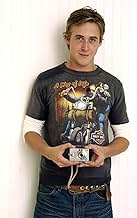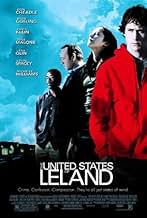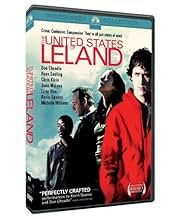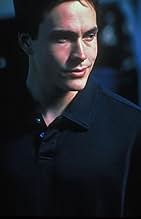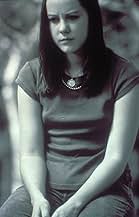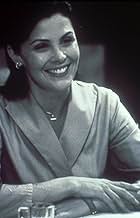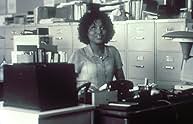A teacher tries to learn why a teen committed murder.A teacher tries to learn why a teen committed murder.A teacher tries to learn why a teen committed murder.
- Awards
- 1 win & 2 nominations total
- Director
- Writer
- All cast & crew
- Production, box office & more at IMDbPro
Featured reviews
Before I saw this film, I read the comment of someone who wasn't very fond of it. This I must admit made me apprehensive to dedicate 1 hour and 48 minutes of my life to it, but I'm glad I did. Ryan Gosling is a fantastic actor, I especially loved the Believer. Don Cheadle was also fantastic. The film presented an interesting view on life and death. It was very touching and very sad, yet it kept me interested, which most touching stories cannot do. It is a film that reckless of whether or not you like it, you should see it. It was unique,and I don;t think that anyone will ever be able to duplicate it. All of the young actors did surprisingly well given the subject matter and the emotion that must have gone into it. I was pleasantly surprised.
The title comes from an alteration an adolescent inmate in a correctional facility makes on the front cover of his school book on government, titled "The United States;" he adds "of (his name)."
Many characterizations in this movie work well -- the scenes between Leland (Ryan Gosling) and Becky (Jena Malone), Pearl (Don Cheadle) and father Fitzgerald (Spacey) as well as with Leland, Becky and sister Julie (Michelle Williams), among many others.
But the central thread of this movie -- the fulcrum on which everything hangs -- is the character and motives of Leland. He's a somewhat shy, passive, nice high school student who daringly introduces himself to Becky whom (we find) is going to an alternative school because of a past history of drug problems. In Becky's family, she has a sister, Julie, who's just graduating from high school and preparing to go on to college; Julie's boy friend, Julie's age (and whose parents' had recently died) is also living with them.
Leland lives with his mother; his father (Kevin Spacey) and mother have long been divorced and his father is a famous novelist. Leland is very perceptive. The young boy in "The Sixth Sense" saw dead people; Leland sees teenage lovers and recognizes that years later they will divorce, that pain is going to follow many people's present experience of happiness. BUT, for reasons that are never made explicit, his prescient gift seems to operate some times, for some people, some relationships, and not for others. ???
Parts of the movie feel a bit like a derivative quilt -- borrowing from "American Beauty," "The Sixth Sense," "The Graduate," and possibly some others I didn't recognize. That wouldn't be bad if only the character of Leland worked.
I think Gosling did a great job of playing Leland but the script and the story imposed limitations. Would such an observant, meditative young man ever be homicidal? Even for altruistic reasons? Nothing in the film gives a reason for this. I'm a retired therapist with much experience working with families and teenagers; while many of the reactions shown in the film work -- this part, this most essential element certainly does not.
And there is at least one other element which, in my experience, would not fit with real life although it's not as critical. The reason for the differences between the sisters, Becky and Julie, are never hinted at but that's okay. Once two sibs begin occupying different roles (one the all good girl, the other the troubled one), the roles themselves can begin driving each other to more extreme positions. For the troubled one, Becky, it's kind of, "what do I have to do to be loved around here -- give up being me and become Julie?" And the pressure to live up to being the All-Good, parent-pleasing child, is no less intense on Julie. So, why would she break up with her boy friend of long-standing and of whom her parents so obviously approve?
Don Cheadle was good as Leland's teacher; all others were good in their parts. 98% of the scenes were good. What was missing was that crucial slip in understanding human nature.
Good acting; flawed story and psychology; worth seeing; not a total loss.
Many characterizations in this movie work well -- the scenes between Leland (Ryan Gosling) and Becky (Jena Malone), Pearl (Don Cheadle) and father Fitzgerald (Spacey) as well as with Leland, Becky and sister Julie (Michelle Williams), among many others.
But the central thread of this movie -- the fulcrum on which everything hangs -- is the character and motives of Leland. He's a somewhat shy, passive, nice high school student who daringly introduces himself to Becky whom (we find) is going to an alternative school because of a past history of drug problems. In Becky's family, she has a sister, Julie, who's just graduating from high school and preparing to go on to college; Julie's boy friend, Julie's age (and whose parents' had recently died) is also living with them.
Leland lives with his mother; his father (Kevin Spacey) and mother have long been divorced and his father is a famous novelist. Leland is very perceptive. The young boy in "The Sixth Sense" saw dead people; Leland sees teenage lovers and recognizes that years later they will divorce, that pain is going to follow many people's present experience of happiness. BUT, for reasons that are never made explicit, his prescient gift seems to operate some times, for some people, some relationships, and not for others. ???
Parts of the movie feel a bit like a derivative quilt -- borrowing from "American Beauty," "The Sixth Sense," "The Graduate," and possibly some others I didn't recognize. That wouldn't be bad if only the character of Leland worked.
I think Gosling did a great job of playing Leland but the script and the story imposed limitations. Would such an observant, meditative young man ever be homicidal? Even for altruistic reasons? Nothing in the film gives a reason for this. I'm a retired therapist with much experience working with families and teenagers; while many of the reactions shown in the film work -- this part, this most essential element certainly does not.
And there is at least one other element which, in my experience, would not fit with real life although it's not as critical. The reason for the differences between the sisters, Becky and Julie, are never hinted at but that's okay. Once two sibs begin occupying different roles (one the all good girl, the other the troubled one), the roles themselves can begin driving each other to more extreme positions. For the troubled one, Becky, it's kind of, "what do I have to do to be loved around here -- give up being me and become Julie?" And the pressure to live up to being the All-Good, parent-pleasing child, is no less intense on Julie. So, why would she break up with her boy friend of long-standing and of whom her parents so obviously approve?
Don Cheadle was good as Leland's teacher; all others were good in their parts. 98% of the scenes were good. What was missing was that crucial slip in understanding human nature.
Good acting; flawed story and psychology; worth seeing; not a total loss.
Don't let any reviews (critics, IMDb users or mine) influence you seeing this movie. I read only the plot premise and became intrigued. After watching, this movie, in my opinion, is definitely worth seeing. It gives a perspective on life that many have probably not contemplated. Its is not however, as Leland himself says, a movie that "can be wrapped up in a neat package with a bow and everything." Other user reviews on this website claim to have a psychological background and imply that the story is not feasible. Quite obviously they missed the entire point of the movie, which is disappointing. to say the least.
In short, it is a well acted, well directed movie. The story is not a feel good one, but I feel if you don't come away from the movie feeling good, you may just have missed something. To characterize it as "art house" is unfair, in my opinion, but as our society likes labels, this is probably the one that fits. If you find you know everything there is to know about the world... I'd suggest skipping this one. If you feel movies should be a form of escape "from the world"... you won't find it here. But if you do watch it... you just might find something in yourself.
In short, it is a well acted, well directed movie. The story is not a feel good one, but I feel if you don't come away from the movie feeling good, you may just have missed something. To characterize it as "art house" is unfair, in my opinion, but as our society likes labels, this is probably the one that fits. If you find you know everything there is to know about the world... I'd suggest skipping this one. If you feel movies should be a form of escape "from the world"... you won't find it here. But if you do watch it... you just might find something in yourself.
It's interesting to contrast Ryan Gosling's brilliant performance as the terrifyingly smart, aggressive, and articulate Jewish Nazi skinhead Danny Balint in Henry Bean's `The Believer' with his characterization of Leland P. Fitzgerald, the sweet, confused middle class child of detached, alienated American whiteness who's murdered an autistic kid in `The United States of Leland.' And this is probably the only reason to see this new movie. The roles are polar opposites, which must have attracted a young actor as talented and adventurous as Gosling. But the movie is a muddle and so, inevitably, is Gosling's Leland. The best actor in the world couldn't make sense out of Matthew Ryan Hoge's sappy, disorganized writing and unsure direction.
This is a movie that never decides where it's going and never develops a pulse. It's ill conceived in a whole list of ways. Leland is in special custody for committing this terrible, inexplicable crime which his fellow inmates consider so evil they call him `Devil Boy.' Yet he is portrayed as a young philosopher, a mild-mannered (if potentially lethal) Holden Caulfield. The disconnect is never explained. The movie purports to be exploring Leland's motives for the killing but it never finds any.
The tension is diffused by telling the story out of order with intercut scenes that build up our knowledge of subsidiary characters like Leland's mean, famous writer father (Kevin Spacey), his mother (Lena Olin), his girlfriend Becky (Jena Malone) ), his girlfriend's little brother and sister and parents, a young guy who lives with them (Chris Klein) and. . . and. . . Hoge doesn't know where to stop.
These subplots weaken all the characterizations, not just the central one, and they rob the movie of any point. Hoge is so interested in the career and love problems of Leland's prison teacher and would-be biographer, Pearl (Don Cheadle), in Leland's nasty, remote dad, in the dilemma of Chris Klein's character, and in Leland's girlfriend's drug issues, that the mystery of Leland and his crime never gets plumbed, even if Hoge knew how to do that, which he doesn't seem to.
Is Leland some kind of perverted saint, or just a mild-mannered psychopath? We never find out. All we know is he has come to look on the world as very sad, and that's the best explanation we get for the crime: he wanted to save the little boy from sorrow.
At one point confused, vague flashbacks about trips when Leland was supposed to visit his father in Paris but wound up in New York reveal yet another subplot as he's semi-adopted by a well off Manhattan family.
This all seems either ludicrous or crazy. If it strikes you as sensitive and deep, maybe you'd better check your own pulse.
Autism advocates are up in arms at the suggestion that Leland's killing of an autistic boy might be merciful, but this is not a portrait of the autistic boy -- who's only glimpsed a few times, or of the crime (ditto). What's even more reprehensible than the slighting of the boy is the suggestion that murder might be seen merely as an expression of teenage angst. The thinking behind this movie doesn't bear looking into, and if you want to demonstrate against every badly written film you're going to be awfully busy.
Another interesting contrast is to compare "The United States of Leland" with Jordan Melamed's `Manic,' where Don Cheadle plays a very similar role as a psychiatrist dealing with a disturbed youth named Lyle (Joseph Gordon-Levitt) who's killed a child in a fit of rage. `Manic' depicts in concrete terms where Lyle's rage comes from. We understand the rage is going to be a lifelong problem, but that with luck he may learn to tame it. There's no nonsense about the sorrow of the world and there aren't a lot of confusing subplots. `Manic," in fact, may be almost too simple, but it fairly bristles with powerful, authentic emotion. The story moves forward with intensity and the performances really sing.
Gosling doesn't shake our faith in his skill as an actor, and Cheadle, Klein, Spacey, and the other principals all do respectable, occasionally fine work, but they can't compensate for how badly this movie is conceived, written, and edited.
This is a movie that never decides where it's going and never develops a pulse. It's ill conceived in a whole list of ways. Leland is in special custody for committing this terrible, inexplicable crime which his fellow inmates consider so evil they call him `Devil Boy.' Yet he is portrayed as a young philosopher, a mild-mannered (if potentially lethal) Holden Caulfield. The disconnect is never explained. The movie purports to be exploring Leland's motives for the killing but it never finds any.
The tension is diffused by telling the story out of order with intercut scenes that build up our knowledge of subsidiary characters like Leland's mean, famous writer father (Kevin Spacey), his mother (Lena Olin), his girlfriend Becky (Jena Malone) ), his girlfriend's little brother and sister and parents, a young guy who lives with them (Chris Klein) and. . . and. . . Hoge doesn't know where to stop.
These subplots weaken all the characterizations, not just the central one, and they rob the movie of any point. Hoge is so interested in the career and love problems of Leland's prison teacher and would-be biographer, Pearl (Don Cheadle), in Leland's nasty, remote dad, in the dilemma of Chris Klein's character, and in Leland's girlfriend's drug issues, that the mystery of Leland and his crime never gets plumbed, even if Hoge knew how to do that, which he doesn't seem to.
Is Leland some kind of perverted saint, or just a mild-mannered psychopath? We never find out. All we know is he has come to look on the world as very sad, and that's the best explanation we get for the crime: he wanted to save the little boy from sorrow.
At one point confused, vague flashbacks about trips when Leland was supposed to visit his father in Paris but wound up in New York reveal yet another subplot as he's semi-adopted by a well off Manhattan family.
This all seems either ludicrous or crazy. If it strikes you as sensitive and deep, maybe you'd better check your own pulse.
Autism advocates are up in arms at the suggestion that Leland's killing of an autistic boy might be merciful, but this is not a portrait of the autistic boy -- who's only glimpsed a few times, or of the crime (ditto). What's even more reprehensible than the slighting of the boy is the suggestion that murder might be seen merely as an expression of teenage angst. The thinking behind this movie doesn't bear looking into, and if you want to demonstrate against every badly written film you're going to be awfully busy.
Another interesting contrast is to compare "The United States of Leland" with Jordan Melamed's `Manic,' where Don Cheadle plays a very similar role as a psychiatrist dealing with a disturbed youth named Lyle (Joseph Gordon-Levitt) who's killed a child in a fit of rage. `Manic' depicts in concrete terms where Lyle's rage comes from. We understand the rage is going to be a lifelong problem, but that with luck he may learn to tame it. There's no nonsense about the sorrow of the world and there aren't a lot of confusing subplots. `Manic," in fact, may be almost too simple, but it fairly bristles with powerful, authentic emotion. The story moves forward with intensity and the performances really sing.
Gosling doesn't shake our faith in his skill as an actor, and Cheadle, Klein, Spacey, and the other principals all do respectable, occasionally fine work, but they can't compensate for how badly this movie is conceived, written, and edited.
Leland Fitzgerald (Ryan Gosling) is sent to jail for the murder of an autistic kid. When pressured with the question 'Why?' he doesn't have an answer. While in jail he meets Pearl (Don Cheadle), his teacher, who decides to take matters into his own hands and helps Leland figure out why he did it. Throughout this film we learn all about Leland's troubled life, including his ex-girlfriend Becky(Jena Malone), his famous father Albert(Kevin Spacey)and his whole sad life.
This film is Matthew Ryan Hoge's second movie, and it is spectacular in nearly everyway. This is one movie which will leave you thinking in the end, and wondering about how it all works. The movie is quite dark, but if you can handle that then you will realize just how good a film it is.
In this movie, there is no bad guy. There is no one you can blame for anything that happens. There's no stereotyping, and the audience does not try to prove Leland guilty. Instead, we sit back, relax, and watch this boy's life unfold throughout the corse of the movie. All the problems depicted in the story are very real. Drug addiction, parental expectations, overwhelming sadness; they all exist in our world.
Ryan Gosling gives one of the greatest performances of his career in this movie, as the depressed teenager Leland. His father lives in Europe and doesn't really care much about his son. The only person he loves is Becky, but she has problems of her own. He knows exactly what he did, but as he says in the film, 'You want a why, but maybe there isn't one. Maybe this is something that just happened.' There is a why, but we don't find out about it until the end. As you watch the movie, the audience finds themselves amazed that such a young person could know so much about the world. Leland notices things that people tend to ignore.
A particular thought-provoking scene which really affected me was during one of Leland's conversations with Pearl. Pearl just cheated on his wife and when Leland asks why, Pearl replies that he's only human. Then Leland says something which never really occurs to anyone: "Why do people only say that when they've done something wrong?"
Another fantastic acting job was provided by Chris Klein. In the film he plays Allen Harris, the boyfriend of Becky's sister Julie (Michelle Williams). Although he is not one of the main characters, I found myself amazed at how deep his character was. You can relate to Allen a lot. You know how much he cares for the Pollard family. It's as if they were his own flesh and blood. By the end of the movie, you realize just how far he would go to help them.
Overall, this movie is a masterpiece which has been overlooked by quite a few people. If, however, you take the time to watch it, you will most likely see that everything I've mentioned above is true. And once you're finished watching it, you'll never look at the world the same way again.
9.5/10
This film is Matthew Ryan Hoge's second movie, and it is spectacular in nearly everyway. This is one movie which will leave you thinking in the end, and wondering about how it all works. The movie is quite dark, but if you can handle that then you will realize just how good a film it is.
In this movie, there is no bad guy. There is no one you can blame for anything that happens. There's no stereotyping, and the audience does not try to prove Leland guilty. Instead, we sit back, relax, and watch this boy's life unfold throughout the corse of the movie. All the problems depicted in the story are very real. Drug addiction, parental expectations, overwhelming sadness; they all exist in our world.
Ryan Gosling gives one of the greatest performances of his career in this movie, as the depressed teenager Leland. His father lives in Europe and doesn't really care much about his son. The only person he loves is Becky, but she has problems of her own. He knows exactly what he did, but as he says in the film, 'You want a why, but maybe there isn't one. Maybe this is something that just happened.' There is a why, but we don't find out about it until the end. As you watch the movie, the audience finds themselves amazed that such a young person could know so much about the world. Leland notices things that people tend to ignore.
A particular thought-provoking scene which really affected me was during one of Leland's conversations with Pearl. Pearl just cheated on his wife and when Leland asks why, Pearl replies that he's only human. Then Leland says something which never really occurs to anyone: "Why do people only say that when they've done something wrong?"
Another fantastic acting job was provided by Chris Klein. In the film he plays Allen Harris, the boyfriend of Becky's sister Julie (Michelle Williams). Although he is not one of the main characters, I found myself amazed at how deep his character was. You can relate to Allen a lot. You know how much he cares for the Pollard family. It's as if they were his own flesh and blood. By the end of the movie, you realize just how far he would go to help them.
Overall, this movie is a masterpiece which has been overlooked by quite a few people. If, however, you take the time to watch it, you will most likely see that everything I've mentioned above is true. And once you're finished watching it, you'll never look at the world the same way again.
9.5/10
Did you know
- TriviaA recurring element of the film is the fact that Leland doesn't have any contact with his father, absent ever since his childhood. Ryan Gosling never shares any scenes with Kevin Spacey and in the courtroom sequence, even though both characters are present, they're never in the same frame.
- GoofsIn this movie, set in Arizona, all the cars shown have front and back license plates. However, in Arizona you are only issued two license plates if you have a personalized plate which none of the cars in the movie had.
- Quotes
Leland: It covers my eyes. It's all I can see. Say there's some kids playing baseball. All I see is the one kid they won't let play because he tells corny jokes. And no-one thinks they're funny. Or I see a boy and a girl in love and kissing, you know. I just see that they're gonna be one of those sad old couples one day who just cheats on each other and can't even look at each other in the eye. And I feel it. I feel all of their sadness. I feel it probably even worse than that sad old couple or that corny kid will ever feel it.
- ConnectionsFeatured in Anatomy of a Scene: The United States of Leland (2004)
- SoundtracksGigantic
Written by Frank Black (as Black Francis) and Kim Deal
Performed by Pixies (as The Pixies)
Copyright 1988 Rice and Beans Music (BMI)
Used by permission. All rights reserved.
Courtesy of Elektra Entertainment Group/4AD
By Arrangement with Warner Special Products
- How long is The United States of Leland?Powered by Alexa
Details
- Release date
- Country of origin
- Official site
- Language
- Also known as
- Leland Birleşik Devletleri
- Filming locations
- Production companies
- See more company credits at IMDbPro
Box office
- Gross US & Canada
- $343,847
- Opening weekend US & Canada
- $48,384
- Apr 4, 2004
- Gross worldwide
- $343,847
- Runtime
- 1h 48m(108 min)
- Color
- Sound mix
- Aspect ratio
- 1.85 : 1
Contribute to this page
Suggest an edit or add missing content







